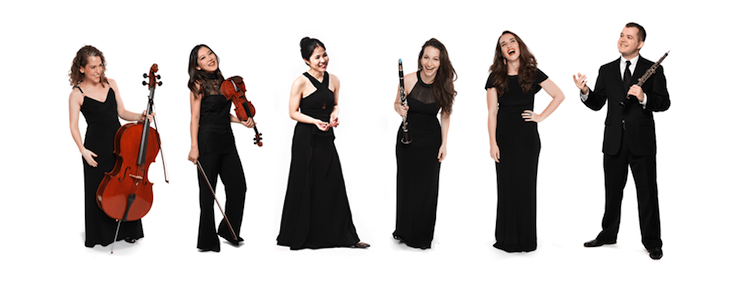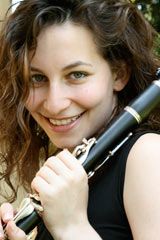by Jarrett Hoffman

That’s the concept behind the partly planned, partly unplanned program assembled by mixed sextet Ensemble Mélange for their performance at the State Room at Sandusky State Theatre on Thursday, March 7 at 7:30 pm.
It’s like a party game, and here are the rules: first, each member of the audience receives a printed program that looks kind of like a restaurant menu, with around twenty works or single movements divided into different categories. Those include types of classical music, like Baroque, Classical, Romantic, 20th-century, and opera, and other genres like latin, jazz, klezmer, and Broadway.
If you get lucky, the group’s random-number generator will match up with the number listed in the corner of your program — and you’ll have your pick of piece, so long as it’s on tap. (In other words, no shouting for Freebird.)
One other restriction: to keep things moving from style to style, no more than one piece can be chosen from a single category. So if someone else calls for Haydn before you can get to Bach, you’re out of luck.
The idea may be quirky, but just to be clear, this sextet (soprano Ariadne Greif, oboist Stuart Breczinski, clarinetist Moran Katz, violinist Grace Park, cellist Sofia Nowik, and pianist Mika Sasaki) is no joke. Park, for one, recently made news as first prize winner in the 2018 Naumburg International Violin Competition.
I recently got in touch with Katz, who co-founded Ensemble Mélange in 2010 — right in between winning first prize in the 2009 Freiburg International Clarinet Competition and the 2013 Ima Hogg Competition. After establishing the ground rules of this program, we delved in a little deeper, beginning with the relationship that develops between players and listeners over the course of a concert.

Jarrett Hoffman: Does the menu change from one night to the next?
MK: It’s totally flexible. If we play a family concert, there might be a Disney category, or movie music. The hope is that there’s something for everyone, so that they can look at the menu when they arrive and immediately know, ‘Wow, I want to hear that. That’s something I’m into.’ We don’t want anybody to come out of the concert feeling like, ‘That wasn’t my kind of thing.’
JH: What’s it like as players to not know what’s coming next?
MK: We have to be on our toes — everybody needs to be awake (laughs). But it also keeps the audience on their toes. They don’t want to pick a piece or a category that’s already been chosen.
JH: Do you go through all the categories?
MK: It depends. Some pieces are longer than others, so if the longer ones happen to be chosen, then there might not be time for everything. The goal is not necessarily to cover everything, but that could happen.
JH: Does the group choose the opener and closer, or are they also random?
MK: Before we even explain everything, we play an arrangement of the Ravel Sonatine for piano by a good friend of ours, Jonathan Karen. It’s an amazing arrangement. I mean, you’d think that Ravel himself did it. And our closer is an Israeli pop tune that we really like — I’ve Got Sympathy by Gronich.
JH: I imagine that over the years, you all have played around with what to include and what not to include.
MK: Oh yeah. Especially the first few years, we experimented a lot with how to build the menu. We want the audience to choose, and we don’t want to force much on them, but we also don’t want the concert to end up being all, say, vocal. It’s kind of hard to explain, but it’s programmed in a way so that even if the audience prefers to hear vocal music, it ends up 50/50 with instrumental.
JH: You mentioned that you play for kids sometimes. Do they ever get upset in the end if they didn’t get to choose a piece?
MK: I mean, adults get equally upset and disappointed (laughs). Some audiences are very polite, and others feel like a town meeting. Let’s say that we choose the last number and everybody knows that means it’s the end of the concert. If it wasn’t their number, sometimes people will be like, ‘Awww!’ Or if somebody is chosen but isn’t really prepared, people start screaming out what they want, to try to influence them.
But we always tell people that no two concerts are the same. So if we play in another town nearby the next day, then we encourage them to come again because even if they don’t get to choose, then the pieces they wanted to hear could be chosen.
Tickets are available at the door — more info here.
Published on ClevelandClassical.com March 4, 2019.
Click here for a printable copy of this article



